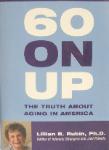The Golden Years? You’ve got to be kidding. Part serious, part comic, these words reflect our ambivalence about aging in the twenty-first century. Is it a blessing or a curse? With refreshing candor and characteristic wit, best-selling author Lillian Rubin looks deeply into the issues of our graying nation, into the triumph of our new longevity, and the pain, both emotional and physical, that lie right alongside it.
Through thought-provoking interviews, research, and unflinching analysis of her own life experience, Dr. Rubin offers us a much needed roadmap for the uncharted territory that lies ahead. In a country where seventy-eight million Baby Boomers are moving into their sixties and economists worry that they’re “the monster at the door” who will break the Social Security bank and trash the economy, where forty percent of sixty-five-year-olds are in the “sandwich generation” taking care of their parents while often still supporting their children, and where Americans eighty-five and older represent the fastest growing segment of the population, we cannot afford to pretend that our expanded old age is just a walk on the sunny side of the street, that “sixty is the new forty,” “eighty the new sixty,” and that we’ll all live happily ever after.
In this wide-ranging book, Dr. Rubin examines how the new longevity ricochets around our social and emotional lives, affecting us all for good and ill from adolescence into senescence. How, she asks, do sixty-somethings fill another twenty, thirty, or more years, post retirement, without a “useful” identity or obvious purpose? What happens to sex as we move through the decades after sixty? What happens to long-cherished friendships as life takes unexpected turns? What happens when at seventy, instead of living the life of freedom we dreamed about, we find ourselves having to take care of Mom and Dad? What happens to the inheritance boomers have come to expect when their parents routinely live into their eighties and and beyond and the cost for their care soars?In tackling the subject of aging over a broad swath of the population, cutting across race, class, gender, and ability, Lillian Rubin gives us a powerful and long-overdue reminder that all of us will be touched by the problems arising from our new longevity. The best hope is to understand the realities we face thoroughly and to prepare—as individuals and as a society—for a long life from sixty on up.
